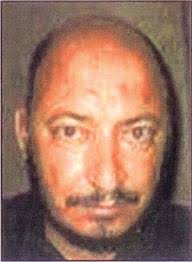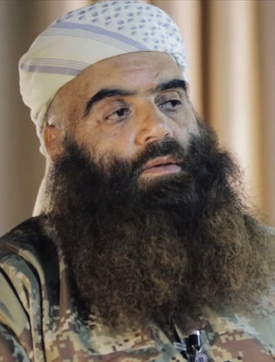Related Research Articles

Al-Qaeda is an Islamic extremist organization composed of Salafist jihadists. Its members are mostly composed of Arabs, but also include other peoples. Al-Qaeda has mounted attacks on civilian and military targets in various countries, including the 1998 United States embassy bombings, the September 11 attacks, and the 2002 Bali bombings; it has been designated as a terrorist group by the United Nations Security Council, the North Atlantic Treaty Organization (NATO), the European Union, India, and various other countries.

Ayman Mohammed Rabie al-Zawahiri was an Egyptian-born terrorist and physician who served as the second emir of al-Qaeda from June 16, 2011, until his death.

Saif al-Adel is a former Egyptian colonel, explosives expert, and a high-ranking member of al-Qaeda who is still at large. Adel is under indictment by the United States for his part in the 1998 United States embassy bombings in Kenya.

Abu Ayyub al-Masri, also known as Abu Hamza al-Muhajir, born Abdel Moneim Ezz El-Din Ali Al-Badawi, was the leader of Al-Qaeda in Iraq during the Iraqi insurgency, following the death of Abu Musab al-Zarqawi in June 2006. He was war minister of the Islamic State of Iraq from 2006–2010 and prime minister of the Islamic State of Iraq from 2009–2010. He was killed during a raid on his safehouse on 18 April 2010.

Hamid Dawud Mohamed Khalil al-Zawi, known as Abu Hamza al-Baghdadi and Abu Omar al-Qurashi al-Baghdadi, was the leader of the militant groups Mujahideen Shura Council, and its successor, the Islamic State of Iraq, which fought against US forces and their Iraqi allies in the Iraq War.
Refa'i Ahmed Taha or Refa'i Ahmed Taha Musa or Ahmed Refa'i Taha, alias Abu Yasser al-Masri was an Egyptian leader of a terrorist component of al-Gama'a al-Islamiyya, having succeeded "The Blind Sheikh" Omar Abdel-Rahman in that role after the latter's arrest in 1993 and imprisonment for life in 1995. He was one of 14 people subjected to extraordinary rendition by the CIA prior to the 2001 declaration of a War on Terror.

Al-Qaeda in Iraq or Al-Qaeda in Mesopotamia, officially known as Tanzim Qaidat al-Jihad fi Bilad al-Rafidayn or TQJBR ، هو العراق و الإسلام السني و الجهادية التنظيم affiliated with al-Qaeda, for two years.
There have been several videos released showing Al-Qaeda leader Ayman al-Zawahiri.

Abu Yahya al-Libi, born Mohamed Hassan Qaid, was a terrorist and leading high-ranking official within al-Qaeda, and an alleged member of the Libyan Islamic Fighting Group.

Al-Nusra Front or Jabhat al-Nusra, known as Jabhat Fatah al-Sham after July 2016, and also described as al-Qaeda in Syria or al-Qaeda in the Levant, was a Salafist jihadist terrorist organization fighting against Syrian government forces in the Syrian Civil War. Its aim was to establish an Islamic state in the country. The group has changed its name several times and merged with and separated from other groups.

Harakat Ahrar al-Sham al-Islamiyya, commonly referred to as Ahrar al-Sham, is a coalition of multiple Islamist and Salafist units that coalesced into a single brigade and later a division in order to fight against the Syrian Government led by Bashar al-Assad during the Syrian Civil War. Ahrar al-Sham was led by Hassan Aboud until his death in 2014. In July 2013, Ahrar al-Sham had 10,000 to 20,000 fighters, which at the time made it the second most powerful unit fighting against al-Assad, after the Free Syrian Army. It was the principal organization operating under the umbrella of the Syrian Islamic Front and was a major component of the Islamic Front. With an estimated 20,000 fighters in 2015, Ahrar al-Sham became the largest rebel group in Syria after the Free Syrian Army became less powerful. Ahrar al-Sham and Jaysh al-Islam are the main rebel groups supported by Turkey. On 18 February 2018, Ahrar al-Sham merged with the Nour al-Din al-Zenki Movement to form the Syrian Liberation Front.

The Mujahideen Shura Council in the Environs of Jerusalem or simply the Mujahideen Shura Council is an armed Salafi jihadist group linked to al-Qaeda that is active in Egypt's Sinai Peninsula and in the Gaza Strip. The group was formed in 2011 or 2012 by Salafist Islamist Hisham Al-Saedni to coordinate the activities of the Salafi jihadist groups operating in Gaza even before the Egyptian Revolution of 2011 and has carried out attacks against civilians in Israel. The group describes violence against Jews as a religious obligation that brings its perpetrators closer to God. Al-Saedni, who was the leader of the group and also of Jahafil Al-Tawhid Wal-Jihad fi Filastin, was killed in an Israeli airstrike in Gaza on 14 October 2012. The group is subordinated with Al-Qaeda in Sinai Peninsula as of August 2012.

Abu-Zaid al Kuwaiti was a high-ranking member of Al-Qaeda, and was considered a potential successor to Ayman al-Zawahiri, the head of the Salafist jihad group. Abu-Zaid was killed in a drone strike in Pakistan.

Al-Qaeda in the Indian Subcontinent usually abbreviated as AQIS, is an Islamist militant organization which aims to fight the governments of Pakistan, Afghanistan, India, Myanmar and Bangladesh in order to establish an Islamic state.

Ahmed Hussein al-Shar’a, known by the nom de guerreAbu Mohammad al-Julani, is the commander-in-chief of the Syrian militant group Tahrir al-Sham; he was also the emir of its predecessor organisation al-Nusra Front, the Syrian branch of al-Qaeda. The US State Department listed Al-Julani as a "Specially Designated Global Terrorist" in May 2013, and four years later announced a $10 million reward for information leading to his capture. As of February 2021, the bounty remains in force.

Radwan Nammous, also known by his nom de guerre Abu Firas al-Suri, was a senior official in the al-Qaeda affiliated al-Nusra Front, serving as the group's spokesman.
Abdullah Abd al-Rahman Muhammad Rajab Abd al-Rahman, known as Ahmad Hasan Abu al-Khayr al-Masri, was an Egyptian al-Qaeda leader who has been described as the general deputy to al-Qaeda leader Ayman al-Zawahiri.

Al-Qaeda in the Sinai Peninsula, or AQSP, is an Egyptian militant jihadist organization possibly formed by a merger between al-Qaeda operatives in Sinai and Ansar al Jihad. It is Al-Qaeda's branch in the Sinai peninsula, and is composed of many Al-Qaeda factions in the area. Despite sharing similar ideology and possibly some resources, AQSP and the Islamic State have never formally affiliated with one another.
Abu Khalid al-Suri, or Mohamed al-Bahaiya or Abu Umayr al-Shami, was a Syrian jihadist militant often affiliated with Osama Bin Laden’s al-Qaeda and the Syrian Islamist group Ahrar al-Sham. Al-Suri was believed to be assassinated by an ISIL suicide attack in 2014, however ISIL denied involvement in the attack.
The history of the Islamic State began with the group's foundation in 1999 by Jordanian Salafi jihadist Abu Musab al-Zarqawi under the name Jamāʻat al-Tawḥīd wa-al-Jihād. In a letter published by the US State Department in February 2004, Zarqawi wrote that jihadists should use bombings to start an open sectarian war in Iraq so that Sunnis from other countries would mobilize against the assassinations carried out by Shias, specifically the Badr Organisation, against Ba'athists and Sunnis. The Islamic State would eventually grow to control territory with a population of millions.
References
- 1 2 "BBC News - Al-Qaeda's remaining leaders". BBC.co.uk. 2013-08-06. Retrieved 2014-02-25.
- ↑ "Al-Qaeda leader targets 'near enemy". Archived from the original on April 20, 2012. Retrieved May 9, 2012.
{{cite web}}: CS1 maint: unfit URL (link) - ↑ "Al Qaeda shura council member appears in first message since 2008". Long War Journal. 2013-07-26. Retrieved 2014-07-04.
- ↑ "Al Qaeda shura council member addresses infighting in Syria". Long War Journal. 2014-04-11. Retrieved 2014-07-04.
- ↑ Ayman Zawahiri. 2 August 2017. Carrying the Weapon of the Martyr, Episode 5: Martyrs of Waziristan